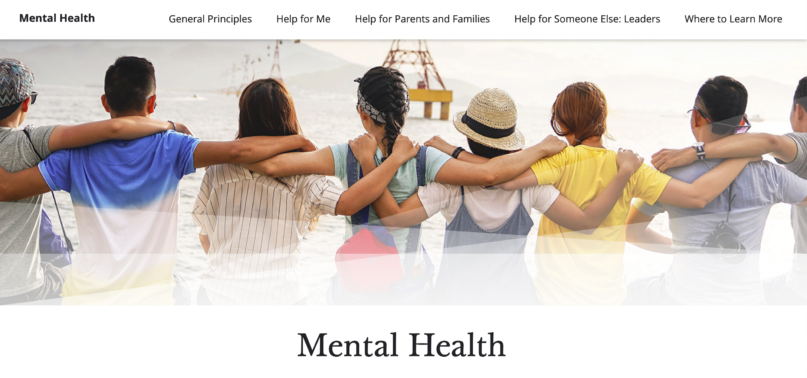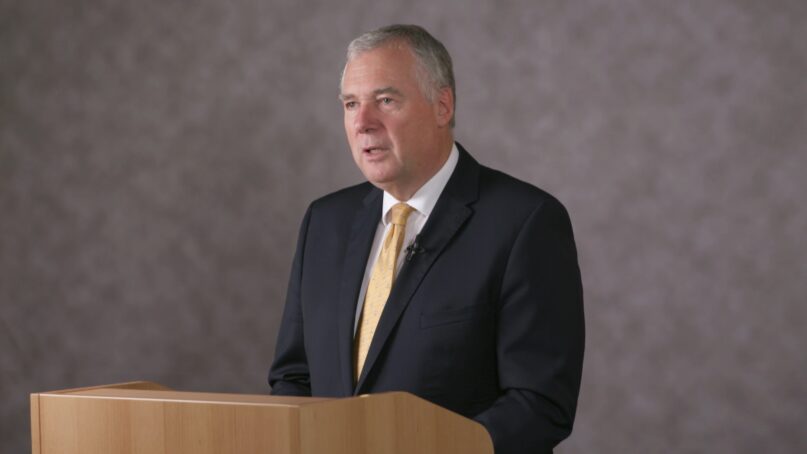(RNS) — Elder Erich Kopischke’s candid General Conference talk hit me in the gut this weekend. He spoke frankly about his family’s struggles with a son who returned home early from a mission because of mental health problems. The son thought seriously about suicide.
In the talk, Elder Kopischke gave assurances that many Latter-day Saints have longed to hear from the pulpit:
- “Challenges often indicate a need for additional tools and support and are not a character defect.”
- “Focusing on growth is healthier than obsessing about our shortcomings.”
- “Open and honest discussions with one another will help this important topic to receive the attention it deserves.”
- “We must love one another and be less judgmental — especially when our expectations are not immediately met.”
I’m grateful a general authority was brave enough to talk about mental illness and how hard it can be to find hope.
This is not something I usually discuss publicly, but I resonated on a personal level.
I’ve been taking care of mentally ill family members spanning three generations now, and I am frankly exhausted. It is, in fact, my father’s birthday, so this is very much on my mind. He would have been 82 years old today. He was an absolute bastard, yet I loved him; he was brilliant and hilarious and he was my father. He was also severely mentally ill, and the damage he caused has rippled forth to his children and grandchildren in ways that are still hard to forgive, more than a decade after his death.
To those of us who deal with mental illness, either our own or in those we love, the church can be both a blessing and a hindrance. On the blessing side, the church teaches me to forgive freely, to love everyone, to extend second and eighth and 77th chances. It emphasizes a gospel of hope and a brighter future. It teaches (importantly for me, and one of the reasons for my conversion to Mormonism as a young adult) that we are not responsible for the sins of our fathers.
And in recent years the church has, like the rest of society, begun to slowly remove the stigma it once attached to mental illness. Elder Jeffrey Holland and Sister Reyna Aburto have discussed depression in General Conference, and as a people we’re now exhuming the story of George Albert Smith’s yearslong treatment for serious mental and physical illness when he was an apostle a century ago. The church buried that story for years, making no mention of it whatsoever in its Teachings of the Presidents of the Church volume on him.
But the church was hardly alone in covering up such things. Mental illness was simply unmentionable. The stigma has been too great.

On the hindrance side, however, the church’s approach to the gospel often adds to my exhaustion. Elder Kopischke’s straightforward and loving General Conference talk is a balm to my soul, but it floats on a river of constant rhetoric about how human beings must “qualify” for exaltation, and how God’s ultimate approval is conditional based on what we do (or fail to do) in this life. Even in this same General Conference, we had a talk about how no unclean thing can dwell with God in heaven, a warning that people who don’t attend church risk losing blessings in this world and the next, and various reminders to improve ourselves.
If I’d never had a mentally ill loved one, I would probably never have questioned those ideas. (I’m a One on the Enneagram, for heaven’s sake: We love things like self-improvement and predictable if-then patterns of behavior and consequences!) But my encounters with mental illness have made me far less sanguine about the universality of one-size-fits-all standards.
The idea of qualifying for blessings works great — unless you’re mentally ill.
Behavioral standards can be helpful, and it’s not really that hard to keep the commandments — for those of us who aren’t mentally ill.
The “covenant path” is the straight and narrow, and everyone should always stay on it — but it’s a whole lot harder if you’re mentally ill.
Here’s what I have learned: Life is very far from a level playing field. Some of us win the mental health lottery, just like some of us win the physical health lottery. And we rarely understand that this is dumb luck on our part rather than personal righteousness.
And because we won the mental health lottery and have little idea what it’s like to walk around with a brain that is diseased, we tend to only see the presenting behavior of those who weren’t so lucky. We judge freely when they can’t seem to control their sexuality or their anger or their impulsivity, not recognizing those as classic symptoms of several mental health conditions. Those people! Why can’t they get their act together?
I’ve done this too. For example, I was in my 30s before I could see that a family member with addictions was mentally ill first and an addict second, because he was trying anything he could to relieve the pain of his disorder. It seems obvious to me now, but that was an aha moment—one I’ve had to remember again and again when I slide into judgmentalism.
When we only see people’s behavior, we miss a whole lot of the story.
The church has always put great stock in correct behavior, so much so that our evangelical friends have sometimes accused us of believing in “works righteousness.” That’s an oversimplification of what we believe about the interplay between faith and action, but it’s certainly true that we believe our choices have consequences, even eternal ones. But lately, it has felt to me like we are ramping up our focus on righteous behavior and certainly on the idea that God’s approval is conditional. The word “qualify” gets a lot of play these days in General Conference, as does the all-new buzzphrase “covenant path,” which was not mentioned a single time in Conference until the 21st century.
If we are serious about becoming more compassionate about mental illness, we need to do the painful work of examining our assumptions about personal righteousness. It’s vital to acknowledge not everyone gets all the tools they need to make the decisions we consider to be righteous and correct.
As I said, it’s not a level playing field. When we emphasize that the Lord can’t abide any unclean thing and his acceptance of us is predicated on all the dazzling feats of self-improvement we’re going to perform, we are not helping.
But when we realize the extent to which mental illness hampers people’s ability to choose the right, we become more compassionate, more like Jesus.
I believe in a God who expects us to do our best, but I also believe in a God who has deep compassion for our limitations. For all the church’s emphasis on the path being narrow, we are missing the fact that God’s table is actually quite wide.
Wide enough for the genetically unlucky, giving them a feast of bread and not stones.
Related content:
“No more shame”: A Mormon apostle sheds light on mental illness — and his own struggles
Mormon women and depression, revisited






